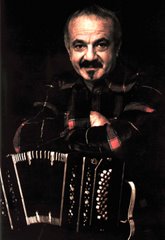
.
Cello Trio
Those who think that Brazilian music is defined by the samba and the bossa nova will be shocked by the
Cello Trio,
as they run through material
by some of that country's renowned classical composers, with tangos by
Ernesto Nazareth, the father
of the genre and opuses by both the great
Heitor Villa-Lobos and the modernist
Jaime M. Zenamon, among others.
They open the door on a world that extends far beyond
the beaches and Carnivals of Rio and Salvador, and do it in a most adventurous
fashion, since a lineup of three cellos together doesn't fit as standard in anyone's book.
.
However, the beautiful arrangements and exquisite playing bring out rare qualities
in the music; there's a moment during Miranda's "Reflexos"
where the cellos seem to imitate a steel guitar, while in Villa-Lobos' "Trenzinho Caipira" one of the instruments seems to play notes impossibly high for a cello.
.
The dark, woody tones offer plenty of shade to the melodies, whether it's the
slithering grace of Nazareth's tangos or the Bach-ian counterpoint of Zenamon's "Entre" The composers here stand with the best out of Europe, illustrating that Brazil
has much to offer that remains largely undiscovered outside the country.
A small gem and a triumph of a disc.
Chris Nickson
The
Brazilian-German Cello Trio - two Brazilians living in Germany, one German living in Brazil - not only documents Brazilians' love for that instrument, it displays its devotion to a repertoire that could not be more Brazilian in its heterogeneity as well as its aesthetic consistency.
The three cellists
Marcio Carneiro, Peter Dauelsberg and Matias de Oliveira Pinto first met in March 1985 at a concert in Paris, when they played the first and the fifth of Villa-Lobos' "bacchianas" at the big UNESCO hall with only Brazilian cellists, who live in Europe.
The three musicians recognized, that they have so much personal and artistic enthusiasm, that working together should be pure fun and music delight.
First the Cello Trio was a project of only private interest, but in the first year of playing together they had already offers for several concerts and in the next year they did their first tour together.
In 1999 they were invited to the international festival "Sandor Vegh" at the Azores to play three concerts, which were extraordinarily successful.
The repertoire of the Cello Trio comprises fin-de-siècle popular salon music by
Ernesto Nazareth, ranging from the national musical language of
Villa-Lobos up to the modern compositions of
Miranda or
Zenamon.
All these styles and musical elements prove that it is not a contradiction for Brazilian music to stick to its own culture while concurrently adapting stylistic innovations. It is a form of music that knows how to stay local without having to give up a serious international claim.
The musicians:Márcio Carneiro, born in Rio de Janeiro, holds a professorship at the State University for Music, Detmold, Germany. He teaches master courses in Switzerland, France, Portugal, Italy and Argentina.
Peter Dauelsberg, born in Bremen, holds a professorship for chamber music at the State University of São Paulo, Brazil. His current instrument is a Domenico Montagnana cello, built in 1740.
Matias de Oliveira Pinto, born in São Paulo, teaches at the Berlin College for Music. He also works as an editor of contemporary cello literature, arranger and composer.
Temas01 cello trio - tango brasileiro - confidencias.mp3
.
02 cello trio - tango brasileiro - julieta.mp3
.
03 cello trio - tango brasileiro - batuque.mp3
.
04 cello trio - tango brasileiro - escorregando.mp3
.
05 cello trio - tango brasileiro - brejeiro.mp3
.
06 cello trio - tango brasileiro - o canto da nossa terra.mp3
.
07 cello trio - tango brasileiro - trenzinho caipira.mp3
.
08 cello trio - tango brasileiro - seresta.mp3
.
09 cello trio - tango brasileiro - baiao.mp3
.
10 cello trio - tango brasileiro - reflexos.mp3
.
11 cello trio - tango brasileiro - entree.mp3
.
12 cello trio - tango brasileiro - boule de cristal.mp3
.
13 cello trio - tango brasileiro - acrobatie.mp3
.
14 cello trio - tango brasileiro - alouette et les paillasses.mp3
.
15 cello trio - tango brasileiro - trapetie.mp3
.
16 cello trio - tango brasileiro - petits enfants et animaux.mp3
Link http://rapidshare.com/files/46035637/RBerdi_CelloTrio-TangoBrasil-02.rar.
 .
.









